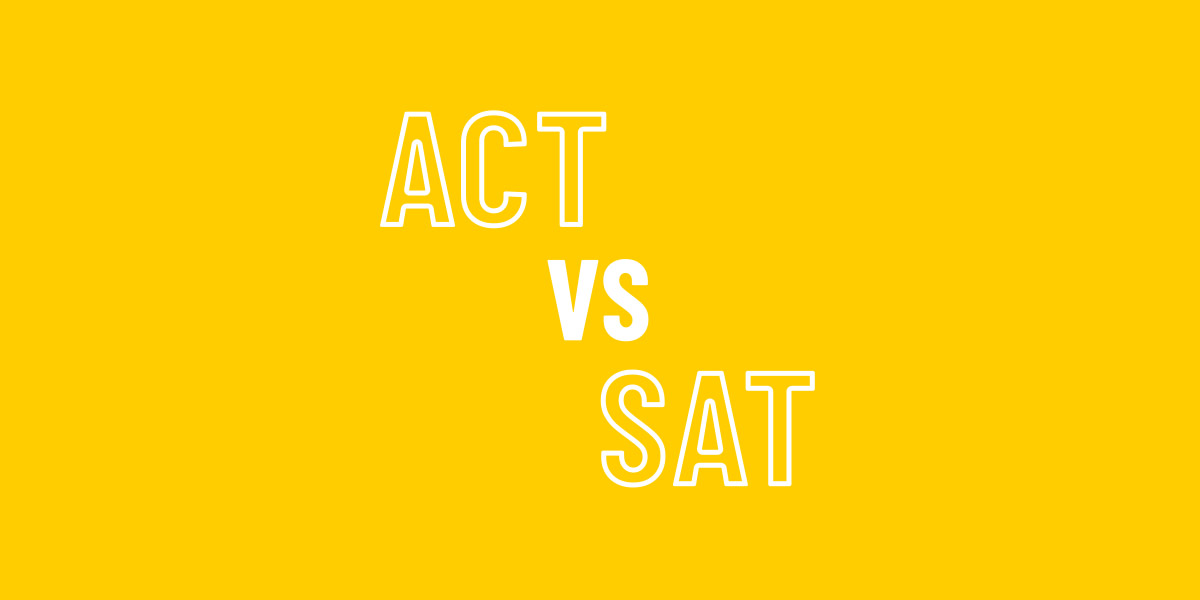One important question many students will need to answer at some point is “should I take the ACT or the SAT? Or both?” The answer often depends on WHO the student is. Many parents may remember ONLY taking the SAT in high school. Or some of us can even remember a time where certain colleges only accepted scores from one specific test. But times have changed!
All colleges and universities now accept scores from both tests interchangeably. Students do not need to take an SAT when applying to specific schools, nor do they need an ACT-specific score for other schools. Regionally in the United States, there are many places where one test is more commonplace than another, but it does not affect what score ends up on a student’s application to college.
What factors determine a student’s test selection can depend on a few things. First and foremost, there are many students out there who have certain strengths that make them better suited for one test over the other. For example, a student’s math ability can have a large impact. For students intimidated by mathematics or reliant on their calculators, the ACT can often be a better test. The ACT Math has much more straightforward questions, and students can use a calculator on all 60 math questions. Additionally, all Math questions on the ACT are multiple-choice. If a student is worried about their Math score affecting their overall composite, Math only makes up 25% of a student’s ACT score. Conversely, the SAT test can contain more complex Math questions, and one section of the test asks 20 Math questions where students are prohibited from using a calculator. On the SAT, Math \ makes up 50% of the overall score. Often when we describe the SAT Math section to a student, we explain that they focus more on depth of knowledge (especially algebraically), whereas the ACT Math section is all about breadth of knowledge (i.e., more topics, but a more shallow knowledge of Math concepts). It is important to note that the ACT does include a Science section, and the SAT does not, but often a student’s Science ability does not necessarily impact a student’s score as much as their Math ability will.
Outside of mathematics, many students will need to assess their reading comprehension strength when deciding on the ACT or SAT. Specifically, many tutors will tell you that students need to consider their reading speed when choosing between the tests. On an ACT, students do not have a significant amount of time to read deeply, re-read, or take notes while reading the test’s passages. For students taking the test with standard time accommodations, they only have 8 minutes and 45 seconds to read each passage and answer the 10 questions that follow the passage. That is FAST. On the SAT, to read a passage and answer roughly the same amount of questions, students have 13 minutes. That’s a big difference. In this case, SAT test-takers will have more time to read closely, take notes, and re-read important lines or paragraphs. But there is a trade-off. While students receive more time on an SAT Reading test, some of the content they’re expected to read can be more complex. In many SAT Reading tests, 1-2 of the passages can be 50-200 years old. These passages feature authors and discussions from the early 1900s, 1800s, and even 1700s. On the ACT, it’s rare that a passage was written or published before 1990, so students are reading much more contemporary pieces. For several years, the SAT has referred to one of their five Reading passages as a “Great Global Conversation”: often a persuasive passage coming from the 18th or 19th century to examine some issue of inequity or inequality during a specific time period. This passage expects a high level of vocabulary, diction, and ornate phrasing that many students may be unaccustomed to analyzing. This kind of language can often feel inaccessible to many modern students. We do find, though, that students who have recently taken an AP U.S. History or AP Language & Composition class may fare better on this type of passage on the SAT. In conclusion, the ACT Reading rewards faster readers with more concrete cognition, and the SAT Reading benefits slower readers with a higher degree of comprehension.
We should clarify that test choice can often depend on whether a student receives any accommodations on the ACT or SAT. For students battling severe mental or cognitive challenges like ADHD, dyslexia, anxiety, or dyscalculia, accommodations are available on the ACT and SAT if a student applies and can submit appropriate documentation to prove why an accommodation is necessary. For students with any kind of reading issue or deficiency who do not apply for or receive accommodations, the SAT can be a better choice because of the longer time limits across each section. The ACT is a fast-paced test, and that can cause an issue for students who struggle with timing but do not qualify for extra time accommodations. For more information, please speak with your student’s counselor and/or a Seeley Test Pros’ test specialist.
Overall, the best way to determine what test a student is better-suited for is to take a practice test for both the ACT and the SAT. When finding or taking practice tests, make sure you’re taking an official ACT or SAT exam, made by either the ACT or CollegeBoard organizations, rather than an outside company. It is critical that students take these practice tests in a way that replicates the real test environment. For more information on practice tests, read our blog “How to Take a Practice Test.” After taking an exam, families can grade their student’s test and make a decision based on actual numbers, rather than assumptions or feelings. We often hear students tell us that the SAT “felt easier” (likely because of the longer time limits), but when it comes down to numbers that student may have a higher overall ACT score. Make this a data-driven decision based on quantitative factors, not qualitative ones. Many students also opt to take both tests, so they have both sets of scores to consider when completing college applications. Many students applying to highly competitive colleges will take both tests after completing preparation just in case. If a student scores well on both tests, they then have the ability to send both sets of scores to their preferred college(s) to emphasize their overall strengths. We at Seeley Test Pros offer all of our students the chance to take full proctored practice tests, so we can assist you in making the best possible decision for you and your family.
We typically recommend that students start the test preparation process with a specific test in mind, that way students and tutors can begin work immediately on what areas a student needs to prepare for most when taking that specific test. Trying to prepare for both tests at one time can be a lofty goal that often overwhelms or confuses many students. If you have any questions or want to discuss your student’s situation with a Seeley Test Pros’ test specialist? Email us at [email protected]. Considering registering for an upcoming ACT or SAT? Register with your student account at mysat.collegeboard.org or myact.org.


